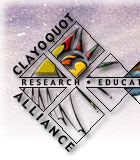|
The Clayoquot
Project is an effort to encourage the study of global
politics through local sites. There have been several dimensions
to the Project:
The Clayoquot Sound Archive Project supports a web site index
of documents relating to the recent history of Clayoquot Sound.
Coasts Under Stress is using a set of carefully-constructed complementary
case studies on the East and West Coasts of Canada to achieve an
integrated analysis of the long- and short-term impacts of socio-environmental
restructuring on the health of people, their communities and the
environment.
Community-University Connections is a community-based research
initiative that explores the use of science in environmental and
social policy, and facilitates collaborative research and information
exchange between community organisations and university-based researchers.
The challenge of POLIS is to create a new set of solutions for our
political, economic, environmental and social institutions. Our goals
are to bring the community back in, to reinvigorate an ecosystem
context for these institutions, to revitalize innovative businesses,
and to discover constructive new opportunities for government agencies
and the state itself. With our unique combination of academic credibility
and activist spirit, we aim to dismantle the notion of the environment
as merely another sector, and bring it into the mainstream where
it belongs, as a core value in all aspects of our society.
The Whale Research Lab at the University of Victoria consists of
a small group of graduate students, interested faculty, associates
and visitors from a number of places. Our approach to marine mammal
research is a little unusual, beginning with our presence in a geography
department. At the core, our interest is conservation, and within
the spectrum of things that conservation can mean, ours lies on the
side of protecting the animals and their environment, rather than
the "wise use" dictum currently vogue by industrial resource
users. The studies we have participated in range from ecology to
socio-historical traditions, and the methods from counting and weighing
pelagic crab larvae to "in-depth" interviews with aboriginal
people about the history of fur sealing.
|
The Clayoquot Sound Central Region Board was created by the 1994
Interim Measures Agreement and continued under the 2000 Interim
Measures Extension Agreement: A Bridge to Treaty. Its mission is
to manage land and resources in Clayoquot Sound, prior to the conclusion
of a treaty, in a manner that: provides opportunities for First
Nations consistent with aboriginal resource uses and heritage,
and considers options for treaty settlement; conserves resources
in Clayoquot Sound and promotes resource use that supports sustainability,
economic diversification, and ecological integrity; and encourages
dialogue within and between communities and reconciles diverse
interests.
View map »
Biosphere Reserves are areas of terrestrial or marine ecosystems
which are internationally recognised within UNESCO's Man
and the Biosphere Program for promoting and demonstrating a
balanced relationship between people and nature. Individual countries
propose sites within their territories that meet a given set of
criteria for this designation. The Clayoquot Sound UNESCO Biosphere
Reserve has as a guiding principle the Nuu-chah-nulth First Nations
philosophy Hishuk ish ts’awalk, or “everything
is one.” This concept stresses the importance of recognising
and learning about the interconnections within and between ecosystems
in order to promote truly sustainable local communities and economies,
while protecting the environment for future generations.
Iisaak was created to provide a new model of forest management
in Clayoquot Sound, and is the direct result of commitments made
by the Nuu-chah-nulth Central Region First Nations and MacMillan
Bloedel Ltd. (now Weyerhaeuser) in the 1996 Interim Measures Extension
Agreement. Through the joint venture agreement, the Central Region
Nuu-chah-nulth First Nations own 51 percent through Ma-Mook Natural
Resources Limited (Ma-Mook) and Weyerhaeuser (formerly MacMillan
Bloedel Limited) owns the remaining 49 percent. In the Nuu-chah-nulth
language, iisaak (pronounced E-sock) means "respect". “Iisaak
Forest Resources is committed to Hishuk-ish ts’awalk (pronounced
He-shook ish sha-walk), the Nuu-chah-nulth belief of respecting
the limits of what is extracted and the interconnectedness of all
things. This guiding principle of respect is the foundation for
restructuring the economic, ecological and social elements of sustainable
resource management in Clayoquot Sound."
Ma-Mook Development Corporation
In 1997 Ma-Mook Development Corporation was established to represent
the collective economic interests of the five Nuu-chah-nulth Central
Region First Nations. In 1998, Ma-Mook Development Corporation
and MacMillan Bloedel signed a shareholders agreement detailing
their partnership in a joint venture company, Iisaak Forest Resources.
The Nuu-chah-nulth Tribal Council represents 14 first nations
on the West Coast of Vancouver Island from Brooks Peninsula north
of Kyuquot to Sheringham Point south of Port Renfrew. Five such
groups make up the Central Region tribes in the Clayoquot Sound
Region.
Formed in May 1997 originally as RAMS, the West Coast Vancouver
Island Aqautic Management Board is a community-based organization
with the purpose of establishing regional management of aquatic
resources in Nuu-chah-nulth traditional territory on the West Coast
of Vancouver Island. The society was a key participant in negotiations
leading to the creation of the Regional Aquatic Mangement Board. |


















